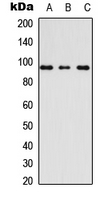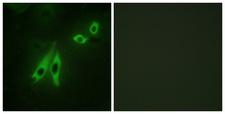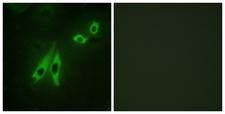order histories, retained contact details for faster checkout, review submissions, and special promotions.
Forgot password?
order histories, retained contact details for faster checkout, review submissions, and special promotions.
Locations
Orders Processing,
Shipping & Receiving,
Warehouse
2 Shaker Rd Suites
B001/B101
Shirley, MA 01464
Production Lab
Floor 6, Suite 620
20700 44th Avenue W
Lynnwood, WA 98036
Telephone Numbers
Tel: +1 (206) 374-1102
Fax: +1 (206) 577-4565
Contact Us
Additional Contact Details
order histories, retained contact details for faster checkout, review submissions, and special promotions.
Forgot password?
order histories, retained contact details for faster checkout, review submissions, and special promotions.
AKAP110 / AKAP3
A kinase (PRKA) anchor protein 3
AKAP110 / AKAP3 is a member of A-kinase anchoring proteins (AKAPs), a family of functionally related proteins that target protein kinase A to discrete locations within the cell. The encoded protein is reported to participate in protein-protein interactions with the R-subunit of the protein kinase A as well as sperm-associated proteins. This protein is expressed in spermatozoa and localized to the acrosomal region of the sperm head as well as the length of the principal piece. It may function as a regulator of motility, capacitation, and the acrosome reaction.
| Gene Name: | A kinase (PRKA) anchor protein 3 |
| Synonyms: | AKAP3, A-kinase anchor protein 3, AKAP 110, AKAP-3, AKAP110, Cancer/testis antigen 82, CT82, Fibrousheathin I, FSP95, Fibrousheathin 1, Fibrousheathin-1, SOB1, Sperm oocyte-binding protein 1, Sperm oocyte-binding protein, Fibrous sheath protein, 95kDa, PRKA3 |
| Target Sequences: | NM_006422 NP_006413.3 O75969 |







If you do not find the reagent or information you require, please contact Customer.Support@LSBio.com to inquire about additional products in development.









